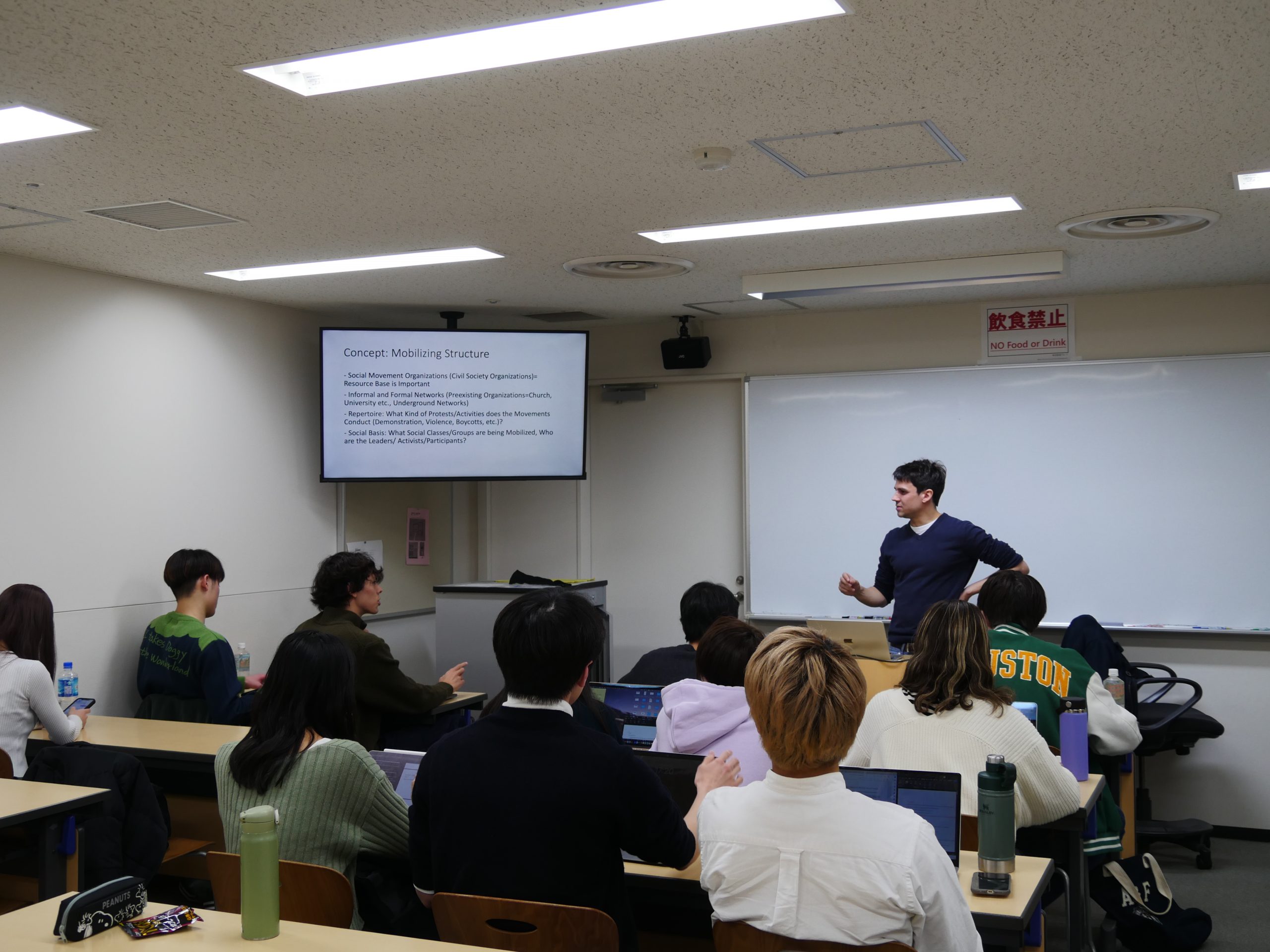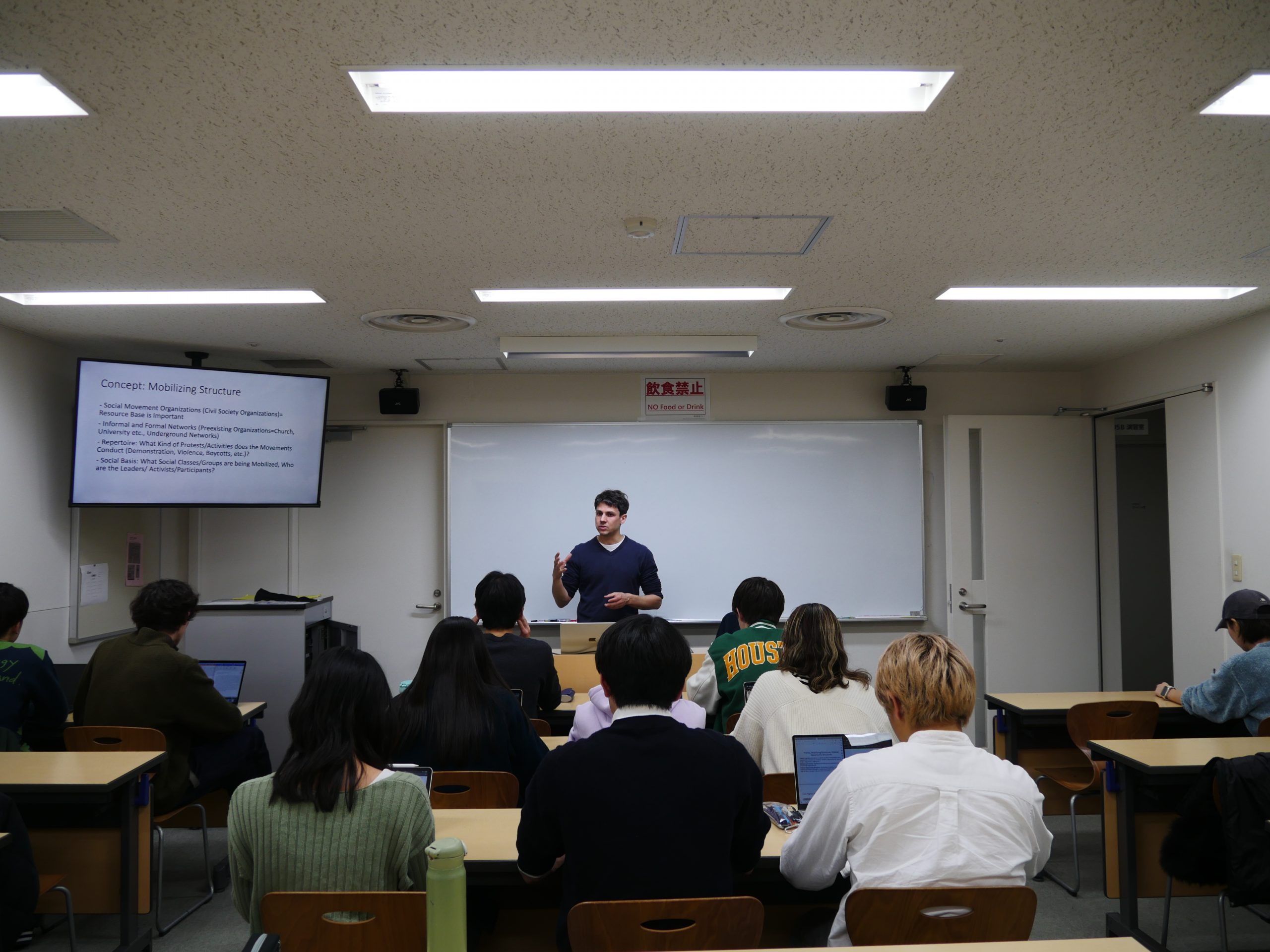授業紹介:Basics of Theories of Civil Society B
教員からのコメント Comment of Professor
In this course, I give an Introduction to basic concepts and theories of civil society and social movements. I aim to situate Japanese civil society phenomena in the wider field of studies of civil society. In more concrete terms, I first give an overview of general theories of civil society and social movements (which are a part of civil society) and then in the second half of the course, I introduce more specific instances of social movement activity in Japan and beyond. An important topic of social movement studies is (also in terms of theory building) the American Civil Rights Movement, which regularly becomes a topic of my courses. However, we also deal with social movements like the movement of victims of Japan’s system of wartime prostitution and the counter movement against it as well as Hongkong’s prodemocracy protests.
I try to give my students an understanding of the relation between the analysis of concrete phenomena and the use of theory and concepts. To analyze social movement activity in-depth, I usually show a movie and analyze it with the students during class. I use presentations to introduce the basic concepts and theories, but since the class size of this class is usually small, I put some emphasis on discussion and repetition in the classroom. It can be challenging to deal with different English levels of the students participating, but I try to get a grip of how much of my lecture the students actually understand by regularly asking questions and having people state their opinion on the content.
この科目では、市民社会と社会運動の基本的な概念と理論について紹介します。日本の市民社会現象をより広い市民社会研究のフィールドに位置づけることを目指しています。具体的には、まず市民社会と(市民社会の一部である)社会運動に関する一般的な理論を概観し、コースの後半では、日本や世界における社会運動活動の具体的な事例を紹介します。社会運動研究の重要なトピックは、(理論構築という意味でも)アメリカの公民権運動であり、これは定期的に私の講義において主題となっています。一方、日本の戦時中売春制度の被害者たちの運動や、それに対抗する運動、香港の民主化デモのような社会運動も扱います。
具体的な現象の分析と、理論や概念の適用との関係を学生たちが理解できるように指導に努めています。社会運動の活動をより深く分析するために、通常は授業中に映画を見せて学生たちと一緒に分析もします。基本的な概念や理論についてはプレゼンテーションで紹介しますが、この授業は少人数で行うことが多いので、授業ではディスカッションや反復練習に重点を置いています。参加する生徒の英語レベルが異なるので難しいこともありますが、定期的に質問を投げかけ、内容について意見を述べてもらうことで、私の講義を学生が実際にどの程度理解しているかを把握するようにしています。

学生からの声 class interview
Q1 Outline of the class.
During classes, students learn about a variety of theories on the study of civil society. Students are able to apply the theories they have learned through discussions based on case studies related to civil society and the development of social movements in Japan as well as other countries and regions. Time is given during the latter half of the classes for question led discussions facilitated by the professor.
Q2 Why did you decide to take this class?
I am most interested in Middle East studies, particularly in democratic movements such as the Arab Spring, as well as the political and social development of Kurdish ethnic organizations and parties in Tukey and Iraq. I decided to take this course so I could learn about civil society and social movements then apply that knowledge during my third and fourth year studies.
Q3 What did you find attractive about this class?
The opportunity to talk about and apply the theories learned in class during the discussions is a big attraction as it allows for a deeper understanding of the subject. The fact that the lectures are conducted in English is another draw for English learners. Although the level of the content is advanced, I felt that the professor was very good at assessing the students’ level of understanding as we progressed which was yet another point for the class.
Q4 How do you want to connect what you learned in the class to the next?
As mentioned above, the most important thing is that I want to link this to my research during the third and fourth year seminars. In the future, I would also like to focus more on civil society actors and be able to grasp the politics, society, culture and economics of different parts of the world.
(Simon De Turck, 2nd year, Faculty of Global Studies)
①授業概要
この講義では、市民社会を研究していく上での様々な理論を学ぶとともに、日本をはじめとした各国・地域の市民社会、社会運動の展開などに関する事例について、学んだ理論を実際に応用して考察する。授業の後半には、教授を中心に問いについてディスカッションする時間も設けられている。
②この授業を履修しようと思った理由
私は中東研究に最も関心があり、「アラブの春」のような民主化運動、トルコやイラクにおけるクルド民族組織・政党の政治的・社会的展開などに興味があったので、市民社会や社会運動について本講義で学び、3・4年次の研究で学んだことを活かせたらと思い、履修するに至った。
③この授業の魅力
やはりディスカッションなどで、学んだ理論を用いて考察する機会があることは、より深い理解にもつながるので、大きな魅力だと思う。また講義が英語で行われることも、英語学習者にとっては魅力的だ。内容は若干ハイレベルではあるものの、教授が生徒の理解度を適宜把握しながら進めてくださる点も、非常に良いと感じた。
④この授業で学んだことを次にどう繋げたいか
先述の通り、3・4年次でのゼミの研究に繋げたいというのが最も大きい。またこれから、より市民社会というアクターについても着目して、世界各地の政治・社会・文化・経済などを捉えられるようになりたいと思う。
(デターク志門 総合グローバル学部2年生)

Q1 Outline of the class.
This class is conducted in English. The class mainly focuses on Japanese civil society with some case studies. We learn about some basic theories of civil society as well. In this class, we sometimes watch videos related to civil society and discuss our thoughts and opinions with classmates in order to deepen our learning. Since the class is small, it allows us to be actively involved through discussions.
Q2 Why did you decide to take this class?
There are two reasons why I decided to take this class. First, I wanted to take a class that is conducted in English so that I can improve my English skills at the same time. I also wanted to discuss global issues related to civil society with classmates in English. Second, I was interested in learning about civil society since I had never learned about it before. When I heard the phrase ‘civil society’, I only had a blurred image of it such as protests and NGOs, so I wanted to learn more deeply about what civil society is.
Q3 What did you find attractive about this class?
I think the attractive point of this class is that we have opportunities to express our opinions during the class since it is smaller than other classes. I also found it attractive to learn about connections between civil society and the government. This course allows me to gain both local and global perspectives, as we do not only focus on civil society in each country but also how it is affected globally.
(1st year, Faculty of Global Studies)
①授業概要
このクラスの教授言語は英語です。この授業では、主に日本の市民社会に焦点を当て、いくつかのケーススタディを行っています。また、市民社会に関する基本的な理論について学びます。この授業では、市民社会に関連するビデオを見て、クラスメートと自分の考えや意見を話し合うことで、学びを深めていきます。少人数のクラスなので、ディスカッションを通して積極的に参加することができます。
②この授業を履修しようと思った理由
このクラスを取ろうと思った理由は2つあります。まず英語で行われる授業を受けることで、自分の英語力を同時に向上させたいと思ったからです。市民社会に関するグローバルな問題について、クラスメートと英語で議論したいという思いがありました。第二に、市民社会について詳しく学んだことがなかったので、興味があったからです。市民社会と聞くと、デモやNGOなどぼんやりとしたイメージしかなかったので、市民社会とは何かをもっと深く知りたいと思ったことがきっかけです。
③この授業の魅力
他の授業に比べて少人数であるため、授業中に自分の意見を述べる機会があることがこの授業の魅力だと思います。また、市民社会と政府のつながりを学ぶことができるのも魅力だと思いました。この授業では、各国の市民社会に焦点を当てるだけでなく、それが世界的にどのような影響を受けているのかを学ぶので、ローカルな視点とグローバルな視点の両方を得ることができます。
(総合グローバル学部 1年生)
